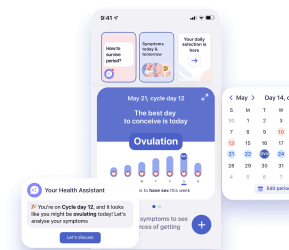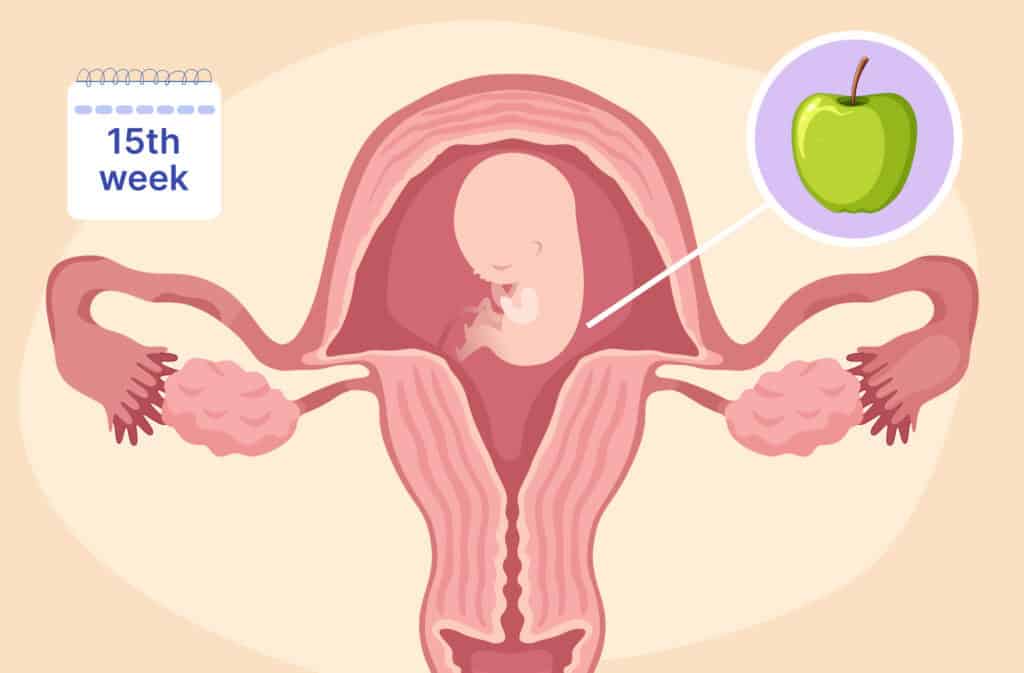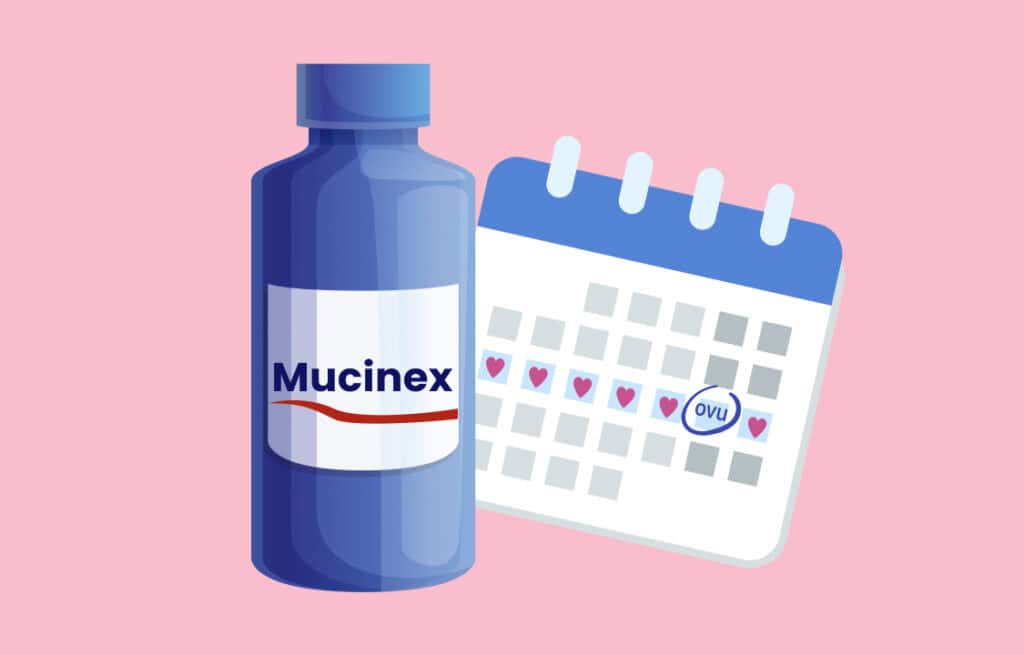Femia > Health Library > Getting Pregnant > Trying to conceive > How to boost fertility: 7 natural ways to increase your chances of getting pregnant
How to boost fertility: 7 natural ways to increase your chances of getting pregnant

- Updated Mar 1, 2025
- Published
CRAFTED BY HUMAN
Crafted by human At Femia, we provide accurate and up-to-date information at every stage of your journey, from trying to conceive, pregnancy and postnatal support. All content is created by a real person based on in-depth research and own professional experience. Femia ensures that you will receive expert advice, strict accuracy and a personalized approach from our authors/medical experts. Learn more about our editorial policy.
FACT CHECKED
Fact checked At Femia Health, we maintain the highest standards of editorial excellence in delivering content focused on helping you conceive, guiding you through pregnancy, and supporting you postpartum. Explore our content review principles to learn how we ensure the accuracy and quality of our health and lifestyle tips for every stage of your journey.
To boost fertility naturally, women can:
- Track their menstrual cycle to identify the fertile window;
- Optimize diet with fertility-supporting nutrients like folic acid and iron and consider fertility-supporting supplements under medical guidance;
- Maintain healthy lifestyle habits and limit harmful substances like alcohol, caffeine, and tobacco;
- Time sex during the fertile window and ave regular sex throughout the month.
If conception doesn’t occur after a year of trying (or six months for women over 35), consult a healthcare provider for personalized advice.
Many women dream of starting or expanding their families, but for some, the conception journey can be more challenging than expected. The frustration and emotional toll of negative tests over and over again are often overwhelming. Adding on the fact that women’s ability to conceive declines with age, and you may start to feel some pressure as conception attempts drag on. With this in mind, fully understanding fertility—and how to boost it—becomes key.
Although there are many medical interventions available today, knowing some natural methods to improve fertility is often a first and effective step in increasing chances of conceiving. These methods may not only help you get pregnant but also promote overall well-being, which is crucial for a healthy pregnancy and a healthy baby.
We’ve created this article exploring how to increase fertility in women to help you take control of your fertility journey. So, read on for our tips.

Understanding fertility
Before diving into how to boost fertility naturally, you should first get to know how reproduction works.
Fertility peaks in the early 20s to early 30s, after which the amount and quality of eggs start to slowly decline. Once a woman turns 35, her fertility drops more rapidly. After 40, the chances of conceiving are lower each month.
However, although age is a key factor, lifestyle choices like smoking and drinking alcohol, health conditions like polycystic ovary syndrome (PCOS), and high-stress levels also affect the chances of getting pregnant. In addition, many of these factors also impact male sperm quality and quantity. So, it’s important for both parents to be involved in lifestyle changes to promote conception.
👉Find out more: How to improve egg quality: Tips for boosting fertility at any age
What causes female fertility problems?
Aside from aging, there are other factors affecting fertility. These include:
Weight
Overweight women tend to have irregular periods and are less likely to ovulate (release an egg) each month. Therefore, their chances of getting pregnant are lower. Losing at least 5–10% of the total body weight may restore a regular menstrual cycle and increase the chance of conceiving. In addition, being underweight can also affect female fertility and cause eggs not to be released as they are supposed to.
Over-the-counter and recreational drugs
Some non-steroidal anti-inflammatory drugs (NSAIDs) may interfere with ovulation. Consuming recreational drugs negatively affects women’s fertility health and the function of the fallopian tube, which plays a key role in conceiving. It transports the egg from the ovary, where it is released, to the womb (uterus) for embryo implantation.
Medical conditions
Conditions like PCOS, endometriosis, thyroid disease, and even vitamin D deficiency can cause fertility issues. Some of these can significantly impact the ability to fall pregnant, like PCOS, which causes fertility rates to drop more rapidly with age than in women without this syndrome. Other conditions are more general and can be treated proactively with medications when diagnosed promptly.
Smoking & alcohol consumption
Women that smoke and consume too much alcohol have been shown to experience delays in getting pregnant. Smoking reduces women’s ovarian reserve and damages their egg quality, making it harder to conceive.
7 natural ways to boost fertility
Now that we’ve covered some of the common barriers to conception, let’s talk about how to combat them with some of the best old tricks to getting pregnant naturally.
1. Chart your menstrual cycle
One of the easiest tips for getting pregnant is to have sex when an egg and sperm have the best chance of meeting. The first step is to chart your cycle and identify the days when you are most fertile—this is called the “fertile window.”
Start by tracking your menstrual cycle to identify your most fertile days, and Femia can help make this process easier!
Considering that the average menstrual cycle is 28 days, women tend to have about a six-day window when they can get pregnant. These consist of the five days before ovulation and the day it happens. Ovulation is the day your ovaries release an egg, but because sperm can survive in the body for up to five days, having sex anytime within this window will still give you a high chance of conception.
Here’s how to track your cycle, and how Femia can assist:
- Use Femia app to log the first day of your period—this marks the first day of your menstrual cycle.
- Track your cycle length for several months with the app to account for monthly variations. Femia will automatically calculate and predict your cycle trends over time.
- Let Femia calculate and notify you about your fertile period!
By regularly updating your cycle data in Femia, the app can notify you of your fertile days, making it easier to plan for conception during your most fertile window.

2. Dietary changes
There is a strong connection between dietary patterns, food choices, and infertility. Whether combined with fertility treatment or on its own, changing your diet can have a measurable effect on fertility. Here are some nutrients to consider trying to add in your daily food choices:
- Folic acid is essential for supporting ovulation and preventing birth defects. It can be consumed via supplements prescribed by a healthcare provider or added to the diet through foods like leafy greens, fortified cereals, and citrus fruits.
- Iron also plays a crucial role in preventing ovulatory infertility. Sources include lean meats, beans, and spinach.
- Zinc helps with hormone production, and it can be found in nuts, seeds, and whole grains.
- Omega-3 fatty acids are found in fish, walnuts, and flax seeds. They support reproductive health by reducing inflammation and improving overall health.
In general, consider including foods like leafy greens, nuts, seeds, fish, and legumes in your diet to ensure a rich intake of these essential nutrients. However, remember to consult a healthcare provider before adding any supplements to your routine.
3. Healthy lifestyle habits
Maintaining a healthy lifestyle is also one of the best tips on getting pregnant, as it not only supports fertility but also significantly affects overall health. This usually involves:
- Regular exercise. An active lifestyle that includes at least 30 minutes of activity every day can help you maintain a healthy weight, which is linked to optimal fertility. Being both over or underweight can disrupt hormone balance and ovulation.
- Adequate sleep. Lack of sleep affects hormone levels, so it is recommended to sleep at least seven hours each night.
- Stress management. Chronic stress negatively impacts overall health. Consider seeking professional help if you feel significant stress in your daily life. Adding practices like yoga and meditation in your daily routine can also help with stress management.
👉Find out more: How soon after unprotected sex can I test for pregnancy?
4. Limit harmful substances
Consuming certain substances negatively affects fertility, so it’s important to limit or avoid them.
- Smoking significantly damages egg quality and reduces fertility.
- Excessive drinking can interfere with hormone levels and ovulation. So, it’s best to avoid alcohol or at least limit it to one drink per day.
- High caffeine intake is also linked to reduced fertility, so try limiting consumption to 200–300 mg per day (about one 12-ounce cup of coffee).
5. Timing intercourse
Optimizing the timing of intercourse is one of the easiest ways to increase the chances of getting pregnant. Consider the following:
- Track ovulation. Refer to the section above to learn how to identify your fertility window (the days leading up to and including ovulation), as it is the best time for conception.
- Ovulation Predictor Kits (OPKs). You can use these kits to detect the surge in luteinizing hormone (LH), which triggers ovulation. It can help you identify your fertility window without tracking your full cycle or if your cycle is irregular.
- Basal body temperature (BBT) monitoring. BBT rises after ovulation, so tracking it can help confirm if ovulation has occurred, allowing for better timing in future menstrual cycles.
6. Have regular sex
Regular intercourse, especially during the fertile window, increases the chances of conception. Studies show that couples having regular sex (every 1–2 days) during the fertile period have the highest chances of getting pregnant. For men, regular ejaculation improves sperm quality, which is also essential for successful conceiving.
7. Take supplements
There are certain natural supplements that have been shown to support fertility. Please always consult a healthcare provider to get personalized recommendations.
Some of these supplements may include:
- Prenatal vitamins that contain nutrients like folic acid and iron—both essential for reproductive health.
- Folic acid helps prevent neural tube defects and supports overall fertility.
- Coenzyme Q10 (CoQ10) may improve egg quality, especially in women over 30.
@femia.fertility Setting a healthy, fertility-friendly routine is a huge step on your fertility journey. We understand that this journey can be long and exhausting, but Femia is here in this with you. By following simple daily tips from Femia, you can optimize your routine and make the entire process smoother. Feel free to share your typical morning routine in the comments! #morningroutine #fertilityjourney #ttccommunity #fertilityroutine #ttcmorning #healthylifestyle #fertilitynutrition #wanttobeamom #ftm ♬ original sound - Femia fertility app
Medical interventions and when to seek help
If you’ve been trying to get pregnant for over a year without success (or six months if you’re over 35), consult a healthcare provider for early evaluation and a personal treatment plan.
The earlier you seek help, the easier it can be to identify any underlying issues and get guidance on the next steps.
In such cases, your doctor can suggest considering fertility treatments. These include:
- Medications like Clomiphene or Letrozole to stimulate ovulation.
- Intrauterine insemination (IUI), which involves manually inserting the sperm into the uterus.
- In vitro fertilization (IVF), where eggs are fertilized outside the body and then implanted into the uterus.
Femia offers personalized fertility insights and cycle tracking tools
Questions from the Femia community
Can diet alone significantly improve my chances of getting pregnant?
Although diet isn’t a magic solution, it can play a crucial role in supporting and improving your fertility when combined with other natural methods and supplements.
Are there specific exercises that can help me boost fertility?
No, you can do whatever activity you want. Yoga, gym, walking or stretching—any regular exercise is a great way to improve fertility by helping to maintain a healthy weight, reduce stress, and boost circulation.
How does stress impact my fertility, and what are the best ways to manage it?
Stress can interfere with hormone levels and ovulation, which may reduce the chances of conceiving. Managing stress is important for fertility and overall health, so consider seeking professional help, talking to friends and family, meditating, and doing breathing exercises.
The bottom line
Boosting fertility naturally involves adopting a healthy lifestyle, tracking your cycle, managing stress, and paying close attention to your diet. While these methods can help improve your chances of conceiving, it may still take some time.
Please remember that every woman’s body and fertility journey is unique, so seeking medical advice when necessary can provide valuable guidance and support. By combining these natural approaches with medical intervention, if required, you can optimize your fertility and start expanding your family.
References
- British Fertility Society. “At What Age Does Fertility Begin to Decrease?» British Fertility Society.” Britishfertilitysociety.org.uk, 2019, www.britishfertilitysociety.org.uk/fei/at-what-age-does-fertility-begin-to-decrease/.
- World Health Organization. “Polycystic Ovary Syndrome.” Www.who.int, 28 June 2023, www.who.int/news-room/fact-sheets/detail/polycystic-ovary-syndrome#:~:text=PCOS%20can%20cause%20hormonal%20imbalances.
- Ozcan Dag, Zeynep, and Berna Dilbaz. “Impact of Obesity on Infertility in Women.” Journal of the Turkish German Gynecological Association, vol. 16, no. 2, 4 June 2015, pp. 111–117, www.ncbi.nlm.nih.gov/pmc/articles/PMC4456969/, https://doi.org/10.5152/jtgga.2015.15232.
- “The Effect of Anti-Inflammatories on Ovulation.” News-Medical.net, 14 Feb. 2022, www.news-medical.net/health/The-Effect-of-Anti-Inflammatories-on-Ovulation.aspx#:~:text=Recent%20research%20suggests%20that%20the.
- Petrozza, John. “Endometriosis and Its Impact on Fertility.” Massachusetts General Hospital, 26 Jan. 2023, www.massgeneral.org/obgyn/fertility/news/endometriosis-and-its-impact-on-fertility#:~:text=Endometriosis%20can%20make%20it%20more.
- ColoCRM. “CCRM Fertility.” CCRM Fertility, 2 June 2022, www.ccrmivf.com/blog/how-vitamin-d-may-impact-your-fertility/#:~:text=Lower%20vitamin%20D%20levels%20were. Accessed 5 Sept. 2024.
- de Angelis, Cristina, et al. “Smoke, Alcohol and Drug Addiction and Female Fertility.” Reproductive Biology and Endocrinology, vol. 18, no. 1, 12 Mar. 2020, https://doi.org/10.1186/s12958-020-0567-7.
- Cleveland Clinic. “Menstrual Cycle (Normal Menstruation): Overview & Phases.” Cleveland Clinic, 9 Dec. 2022, my.clevelandclinic.org/health/articles/10132-menstrual-cycle.
- Pfeifer, Samantha, et al. “Optimizing Natural Fertility: A Committee Opinion.” Fertility and Sterility, vol. 107, no. 1, Jan. 2017, pp. 52–58, https://doi.org/10.1016/j.fertnstert.2016.09.029.
- Kim, Tae Won, et al. “The Impact of Sleep and Circadian Disturbance on Hormones and Metabolism.” International Journal of Endocrinology, vol. 2015, no. 591729, 2015, pp. 1–9, www.ncbi.nlm.nih.gov/pmc/articles/PMC4377487/, https://doi.org/10.1155/2015/591729.
- VANVOORHIS, B, et al. “The Effects of Smoking on Ovarian Function and Fertility during Assisted Reproduction Cycles.” Obstetrics & Gynecology, vol. 88, no. 5, Nov. 1996, pp. 785–791, https://doi.org/10.1016/0029-7844(96)00286-4.
- 3nrIQu3. “Myths and Facts about Caffeine Consumption and Fertility.” Ovoclinic | Clínica de Reproducción Asistida, 30 Nov. 2023, ovoclinic.net/myths-and-facts-about-caffeine-consumption-and-fertility/?lang=en. Accessed 5 Sept. 2024.
- “Calculating Your Monthly Fertility Window.” Www.hopkinsmedicine.org, 10 Mar. 2022, www.hopkinsmedicine.org/health/wellness-and-prevention/calculating-your-monthly-fertility-window#:~:text=Your%20fertile%20window%20is%20the.
- How Often Do You Need to Have Sex to Get Pregnant? – Coyne Medical. 11 Feb. 2022, coynemedical.com/how-often-do-you-need-to-have-sex-to-get-pregnant/.

Learn what’s happening at 15 weeks pregnant, from fetal development and common symptoms to ultrasound insights and self-care tips.

Considering using Mucinex to help you get pregnant? Find out whether the Mucinex pregnancy trick is fact or fiction, how to use it, and who should stay away.

Discover the reasons behind PCOS belly and learn effective strategies to manage and reduce abdominal fat caused by polycystic ovary syndrome.

